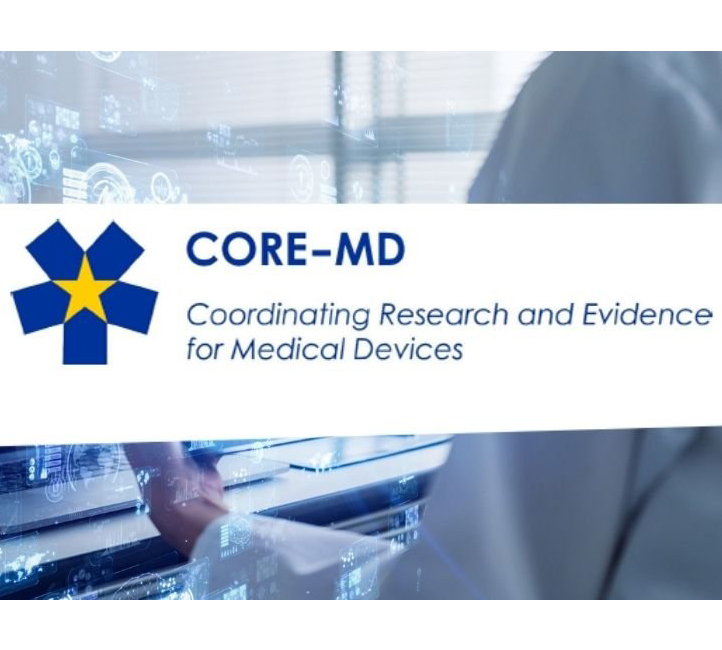Brussels, Belgium | 16 September 2025
The CORE-MD (Coordinating Research and Evidence for high-risk Medical Devices) consortium is publishing new consensus recommendations today in The Lancet Regional Health Europe, that set out scientifically robust methodologies for clinical investigations of high-risk medical devices.
These recommendations respond directly to a request from the European Commission to provide expert advice on trial design, addressing a longstanding gap in guidance for the evaluation of high-risk technologies such as cardiovascular implants, orthopaedic devices, and systems for managing diabetes.
Unlike medicines, which must demonstrate safety and efficacy before market entry, high-risk medical devices in Europe are required to provide only “sufficient clinical evidence” – a standard that is not defined in detail. The CORE-MD analyses confirm that many devices have entered the market without robust evidence from randomised trials, often with little or no data in the public domain.
Key recommendations from CORE-MD include:
- A four-stage framework for clinical investigations, from initial studies through to long-term follow-up.
- Greater use of randomised controlled trials, including sham-controlled trials with appropriate ethical safeguards.
- Efficient large-scale trials embedded in registries to accelerate evidence generation.
- Mandatory transparency of study design, protocols, and results.
- Tailored approaches for breakthrough or orphan devices, requiring post-market confirmatory studies.
Professor Alan Fraser, Coordinator of the CORE-MD project, said:
“These recommendations provide a clear scientific foundation for the evaluation of high-risk medical devices in Europe. Unlike the European Medicines Agency or the US Food & Drug Administration, which utilise regulatory science, the EU framework has relied in the past on legal interpretation rather than clinical principles. By setting out a hierarchy of methodologies, we can now help developers, regulators and clinicians implement strategies that deliver robust, transparent, and patient-relevant evidence.”
The CORE-MD consortium – funded by the EU Horizon 2020 programme, and led by the European Society of Cardiology (ESC) with the Federation of National Societies of Orthopaedics and Traumatology (EFORT) – brought together 100 leading academic trialists, clinicians, regulators, patients, and health technology assessment experts across Europe. Its findings have already informed proposals for reform of the EU regulatory system from the Biomedical Alliance in Europe, representing 35 medical societies.
Professor Rob Nelissen, fFirst EFORT Vice-President and member steering committee CORE-MD commented
“The European Federation of National Societies of Orthopaedics and Traumatology welcomes the CORE-MD recommendation on the design and requirements for clinical investigations of high-risk medical devices in Europe. It is crucial that the level of clinical evidence for medical devices be adjusted to the phase of development and its place within the life cycle. With these recommendation, clear indication on the type of evidence needed to be generated is provided, leveraging also the potential of the well-established high validity registries, in which Orthopaedics is a worldwide front-runner. Altogether the CORE-MD recommendations help in reducing uncertainty on evidence needed for class III medical devices. It is now up to the Medical Device Coordination Group to review the findings and determine whether to capitalise on this Study to create and update existing guidance documents.”
The recommendations have been submitted to European Union regulators for consideration in future guidance on medical device clinical evaluation. A central challenge now will be ensuring their implementation within the EU Medical Device Regulation framework to safeguard patient safety while supporting innovation.

The recommendations are published in The Lancet Regional Health – Europe: Fraser AG, et al., on behalf of the CORE-MD consortium. Recommended methodologies for clinical investigations of high-risk medical devices – Conclusions from the EU CORE-MD Project.
The CORE-MD project was funded by the European Union’s Horizon 2020 Research and Innovation programme (Grant agreement No. 965246). https://www.core-md.eu/
Authors: Fraser AG, Buccheri S, Byrne RA, Kjaersgaard-Andersen P, James S, Jüni P, Bally L, Bulbulia R, Koletzko BV, Landray MJ, Louati C, Lübbeke A, Marang-van de Mheen PJ, McCulloch P, Patro-Golab B, Rademakers FE, Schnell-Inderst P, Siontis GCM, Torre M, Wild C, Zeisl Y, Melvin T, Nelissen RGHH; on behalf of the CORE–MD consortium.
Recommended methodologies for clinical investigations of high-risk medical devices – Conclusions from the European Union CORE–MD Project. The Lancet Regional Health Europe. 2025. (E-pub] doi: 10.1016/j.lanepe.2025.101460
https://www.thelancet.com/journals/LANEPE/article/PIIS2666-7762(25)00252-2/fulltext

About EFORT: The European Federation of National Associations of Orthopaedics and Traumatology (EFORT) works together with its membership network and partners to restore and secure mobility, musculoskeletal health and quality of life. Established as a pan-European partner for international organisations, authorities, universities, industry, scientific bodies and professional and patient organisations in the field of musculoskeletal disease and trauma, EFORT promotes the exchange of scientific knowledge and experience in the field of prevention and both the conservative and surgical treatment of diseases and injuries concerning the musculo-skeletal system. Its headquarters are based in Rolle, Switzerland. – For inquiries, please contact media@efort.org.

Full CORE-MD Recommendations
PDF Document | 14 pages | 2.7 Mb



